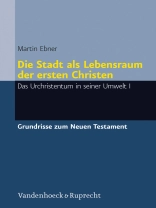This volume describes, in layman´s terms and yet against a well-founded scientific background, how early Christianity was transformed from a rural to a urban movement. The author describes the contours of what later became known as Christianity.This volume offers a broad description of the developmental history of early Christianity. It provides indepth information in easy-to-understand terms about how the originally rural movement called Christianity eventually became an urban entity. Particularly the ‘environment’ of early Christianity and the social and religious structures as well as the architecture of the ancient city are described in detail. Ebner presents us with the temple and imperial cults of the time, life in the domestic household, and the role of the mystery cults along with the philosophy and important municipal mores of the day: oracles, healing cults, magic. Each chapter asks the question: How much did the Christians integrate existing structures and at what junctures did they modify them? Those junctures are the ones at which the outline of early Christianity becomes clearest.
Sobre o autor
Martin Ebner ist Professor em. für die Exegese des Neuen Testaments an der Rheinischen Friedrich-Wilhelms-Universität Bonn.












